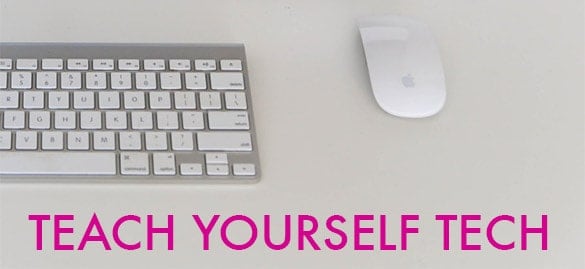If there’s one field that has a high potential for making a good income, that keeps your mind sharp… it’s got to be “getting techy with it”.
In this article we’ll be talking about how to start a career in tech… but first, why should you consider a career switch into the tech space right now?
Let’s face it, the economic downturn of the early 2000s had a lot of people reevaluating their career choices and their motivations for zeroing in on certain kinds of jobs.
A job that has stable demand and is important to many different kinds of industries suddenly looked pretty appealing to people who realized that the jobs that supported them financially could dry up fast when budgets began to shrink.
It’s never too late to make a career change!
Whether you’re entering the workforce for the first time or considering a new career choice after years of employment, it’s important to think about the potential you have to succeed in a given job and its overall demand.
When you analyze the job market, it’s easy to see that tech jobs and freelance contracts have a huge potential for growth and offer competitive salaries nationwide.
According to the U.S. News and World Report article, “Best Technology Jobs”:
“The Labor Department slots tech jobs among the fastest-growing this decade, but it’s not just hiring demand that makes this the industry to watch. U.S. News’ 11 Best Technology Jobs of 2015 also boasts an alluring yin-yang of high salaries and low unemployment rates.”
How To Start A Career In Tech: Research and Pick Your Focus
You see, technical skills are in demand in the freelance space, and there are ways to pick up contract work, or small side projects that can add to your income while you test the waters.
Once you recognize the potential for a career where your skills will always be in high demand and you have the flexibility you desire, the question remains… How do you get started with a career in tech?
Tech jobs are the most likely to allow you to telecommute. Score!
Starting a career in the tech space is a broad undertaking, so it’s important to decide what type of “tech skills” you want to focus on.
Whether you think you would like to be a programmer, a systems analyst, a designer, an engineer or a security analyst, do a little research.
Find out what people love and hate about each of these jobs.
Can you live with the intense deadlines and odd hours programmers sometimes have to put up with, in a crunch?
Are you willing to submit to critique and go back to the drawing board as a graphic designer?
Every job will have some less desirable aspects to it, but knowing what type of work you enjoy will make the learning curve worthwhile.
If you really believe your personality is well suited to the job you want, take the next step, and work through a tutorial in your field. You can find a lot of “do it yourself” materials online.

If you can’t get through a tutorial or the first few chapters of a book on the subject, don’t give up.
Try doing a small-scale project or “tinkering” with the tools before you move onto a different tech skill or field.
Taking the time to be sure you really love the tech field you are pursuing will save you from having to make another job change in a few years.
Once you’re sure about the type of work you want to pursue, there are many paths you can consider to a rewarding technical career.
As you consider these options, do a little research about the tech career path you have your eye on, look at hiring posts and see what the requirements are so you know how to prepare.
4 Entry Paths For How To Start A Career In Tech
1. A Traditional College Degree
If you have the time and money to pursue a bachelor’s degree, this is a great way to begin your hunt for a tech job.
Remember that you can save some money by taking your first two years at a local community college before transferring to a university.
Most bachelor’s programs will let you receive course credit for your life experiences, either by taking tests or writing essays. Ask your advisor what non-traditional credit opportunities you may be eligible for.
As someone who has a degree in Software Engineering, I will say that my education gave me the foundations for a technical career… but most of the learning and applicable know-how I’ve gained has been “on the job” or self-taught.
The reality is that what most colleges and Universities teach is theory, and not “real-world” hands-on training. It’s absolutely useful, but not necessary to start a career in tech.
2. A Bootcamp Program
Tech jobs have such a high need for qualified applicants that many companies are happy to consider employees who learned their skills at a boot camp.
Bootcamps typically offer you accelerated learning in a few months instead of several years.
These learning programs are often accompanied by a higher price tag and it will be hard to work a full-time job while completing a boot camp, so make sure the places you want to apply to work will consider applicants who graduate programs like these before you enroll.
3. Teach Yourself
Tech industries value skills and experience over a degree. Some larger companies will not interview applicants who don’t have a four-year degree, so keep that in mind if you’d like to pursue a corporate position.
However, there are many companies that are dying to hire anyone who can just competently do the work and solve the tech problems that need to be solved.
The Forbes article, “15 Great Jobs That Don’t Require a Four-Year Degree” describes a tech company’s hiring priorities,
“Code samples or postings on the code-sharing site Github.com mattered most. Wengrow and his colleagues also cared about whether the candidates’ personalities fit in with the office’s easygoing atmosphere. “Of the people we hired, I have no idea who had a degree or not,” he says. “It was such a minimal factor. If we liked them and thought they were cool and they wrote good-quality code, that’s all that mattered.”
You can absolutely save yourself time and money by teaching yourself how to program.

A programmer is constantly learning new coding languages and adapting to changes in technology throughout their career, so being able to follow a tutorial, and learn on your own is actually a pretty important skill for you to have in a tech-related field.
The internet is full of resources for learning to program.
Once you have worked hard and taught yourself a lot through completing small projects on your own, you could pursue a small company and ask if you could work for them in an apprenticeship-style role.
Explain that you are self-taught and want to keep learning as you go. They will appreciate your initiative and the fact that you will be willing to work for less as you gain experience.
You will have to prove that your self-taught skills are up to snuff, but if you took the learning process seriously that shouldn’t be hard to do.
When you’re ready, apply for entry-level positions at companies that don’t require a bachelor’s degree. Or start your freelancing career from there!
Remember, most employers and business owners would rather have a skilled applicant than one with a degree but no working experience.
4. Work For Yourself
When it comes to tech skills, one of the best ways to learn is simply to do.
You can teach yourself how to program or design with online resources, books, videos, and tutorials.
You can take on small projects that you can sell through an app store or offer to freelance clients when you are finished.
If you have any friends or acquaintances who work as freelancers in a tech field, ask if they have any work or projects they can throw your way as you’re learning.
They will also be a great resource for you if you have questions along the way.
So, Are You Ready To Start A Career In Tech?
Starting a tech career, like any great tech problem, doesn’t have just one solution.
You can approach your new career path in many different ways, using your creativity and problem-solving skills to take a path that will best suit your specific goals.
You can teach yourself as you go, while you continue to work in your current job, or you can pursue a more traditional route. Don’t put it off, a career you love could begin with the simple steps you take today!




